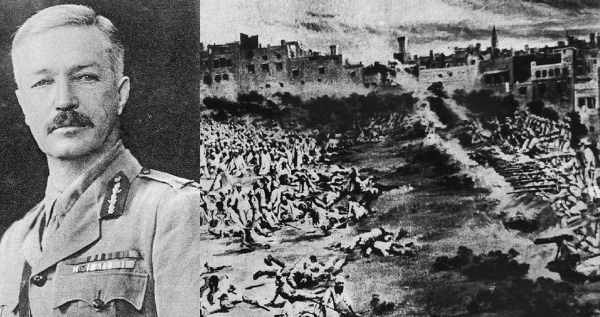When General Dyer defended the Jallianwala Bagh massacre he ordered!
After the Jallianwala Bagh massacre, a British newspaper "Morning Post" on the morning of July 8, 1920, greeted its readers with an article titled "For General Dyer. The Man Who Saved India".
Total Views |
The Jallianwala Bagh massacre that took place on April 13, 1919, in Amritsar, Punjab, continues to be a reminder of the atrocities inflicted upon the Indian people during British colonial rule. It is one of the tragic events that marked a turning point in India's struggle for independence in demanding self-governance and freedom from British oppression.

Background
The massacre took place against the backdrop of the Rowlatt Act, a controversial and repressive law enacted by the British colonial government in 1919. The Act empowered the government to arrest and detain Indian citizens without trial. It had sparked widespread protests and agitation across the nation. Similarly, thousands of protesters had gathered in the Jallianwala Bagh on April 13, 1919, to oppose the law and express solidarity with the leaders arrested under its provisions.
The Massacre
On April 13, 1919, thousands of Indians gathered at Jallianwala Bagh, a garden in Amritsar which was surrounded by high walls on all sides and had only a narrow entrance. Among the attendees were men, women, and children, many of whom had come to celebrate the spring festival of Baisakhi. The gathering was peaceful and nonviolent and they were UNARMED.
The British colonial government, led by General Reginald Dyer, viewed the protest as a challenge to their power and chose to intervene. Dyer marched into Jallianwala Bagh accompanied by 25 Gorkha soldiers, 40 Gorkhas armed with only Khukris, and 25 Baluchis armed with rifles and two armoured cars. They blocked the sole exit and, without warning, ordered them to open fire on the crowd.
The soldiers continued firing for about ten minutes, leaving an estimated 379 people dead and more than a thousand injured before they ran out of ammunition. The massacre was an indiscriminate act of violence, with victims including men, women, and children. In the aftermath, General Dyer justified his actions, stating that "they were necessary to maintain order and prevent further unrest.”
Dyer's last words on the massacre -
Dyer died of cerebral hemorrhage and arteriosclerosis on 23 July 1927. On his deathbed, Dyer reportedly said, "So many people who knew the condition of Amritsar say I did right...but so many others say I did wrong. I only want to die and know from my Maker whether I did right or wrong."
Dyer died of cerebral hemorrhage and arteriosclerosis on 23 July 1927. On his deathbed, Dyer reportedly said, "So many people who knew the condition of Amritsar say I did right...but so many others say I did wrong. I only want to die and know from my Maker whether I did right or wrong."
Consequences
The Jallianwala Bagh massacre shocked the world, sparking widespread outrage both in India and abroad. In Britain, the massacre initially received support from some quarters, with General Dyer even being hailed as the "Savior of the Punjab." But, General Dyer was removed from the duty after the Hunter Commission submitted its report. However, a British newspaper "Morning Post" on the morning of July 8, 1920, greeted its readers with an article titled "For General Dyer. The Man Who Saved India" and started a benefit fund which raised over £26,000 sterling. The article was published days after the British authorities had removed General Reginald Dyer from his post.
Hunter Commission report
Six months after the massacre, on October 14, 1919, a committee was constituted by Secretary of State for India Edwin Montagu to investigate the incident. The Disorders Inquiry Committee was established accordingly with former Solicitor General of Scotland Lord William Hunter as the president.
The majority of the members chastised Dyer for having a misplaced sense of duty.' It stated that Dyer's motive for producing a sufficient moral effect was to be condemned. The lack of notice to disperse from the Bagh, in the beginning, was an error; the length of firing demonstrated a grave error.
The Hunter Commission's report concluded that the Indian gathering was not the result of a pre-planned conspiracy. It claimed that rioting in Amritsar had devolved into rebellion. However, there was no legal action taken against him; he was paid half-pay and received his army pension.

